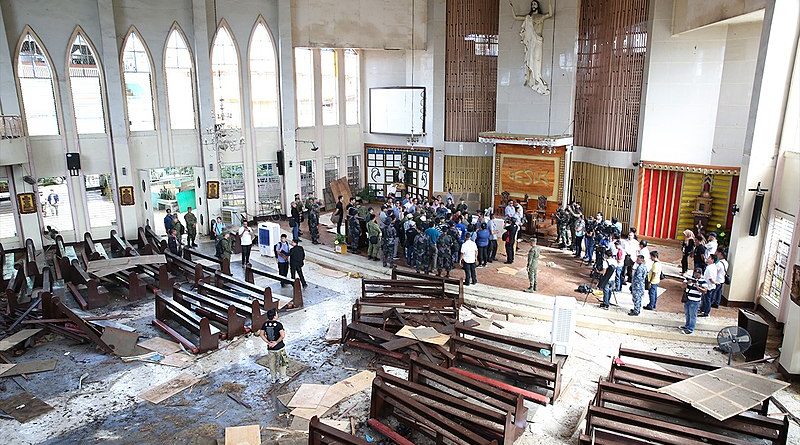Philippine Cathedral Bombing Kills Twenty, ISIS Claims Responsibility
Kaitlin Principato
Staff Writer
On Sunday January 27, two bombs exploded in the Cathedral of Our Lady of Mount Carmel in Jolo, the capital of Sulu Province, Philippines, reports CNN. The improvised explosive devices were detonated while mass was in session: one inside the church and the other in the cathedral parking lot. This attack left approximately 20 individuals dead and over 80 in serious condition.
According to The Guardian, the blasts occurred a week after minority Muslims in the predominantly Catholic nation endorsed a plan for a new autonomous region. Even though most Muslim regions accepted this autonomy deal, voters in Jolo rejected the region’s inclusion.
Hours after the attack, The Islamic State of Iraq and Syria (ISIS) claimed responsibility through the chatroom application Telegram, reports the New York Times. Although the terrorist act shocked the nation, this is not the first time this cathedral has been a target of such activity.
Both the Islamic State and Abu Sayyaf struck the cathedral with grenade attacks in 2010 and 2013. The Philippines has fought Islamist separatist groups such as Abu Sayyaf and ISIS for decades in the country’s predominantly Muslim Mindanao region.
The New York Times further reports that Abu Sayyaf is to blame for some of the worst attacks within the Philippines. Abu Sayyaf’s attacks include brutal kidnappings, hostage operations, and a 2004 ferry bombing, which stands as the world’s deadliest terrorist attack at sea and the most fatal attack on Filipino soil.
In response to the attack, Salvador Panelo, a spokesperson for Philippine President Rodrigo Duterte told the New York Times, “We will pursue to the ends of the earth the ruthless perpetrators behind the dastardly crime until every killer is brought to justice and put behind bars… The law will give them no mercy.” As reported by Al Jazeera, Abu Sayyaf is blacklisted as a terrorist organization by both the United States and the Philippines.
President Duterte himself stated, “The enemies of the state have boldly challenged the capability of the government to secure the safety of the citizenry in that region. The armed forces of the Philippines will rise to the challenge and crush these godless criminals.”
Governor Mujiv Hataman, Governor of the Autonomous Region in Muslim Mindanao, told the Guardian, “This bomb attack was done in a place of peace and worship, and it comes at a time when we are preparing for another stage of the peace process.”
The significance of the attack’s motivation raises concerns for further conflict in the region, which is home to various rival militant groups that are not concerned with a compromise in the peace process in Mindanao.
Many Western countries have confirmed their support for the autonomy pact as it reflects a positive step in securing the region. Violence between Muslims and Christian plagued Mindanao for decades; leading the West to worry that the attacker’s motivations are still deeply rooted in smaller Middle Eastern militant cells. These groups could potentially form alliances with Filipino insurgents, devolving the country’s southern region into a breeding ground for extremists.


